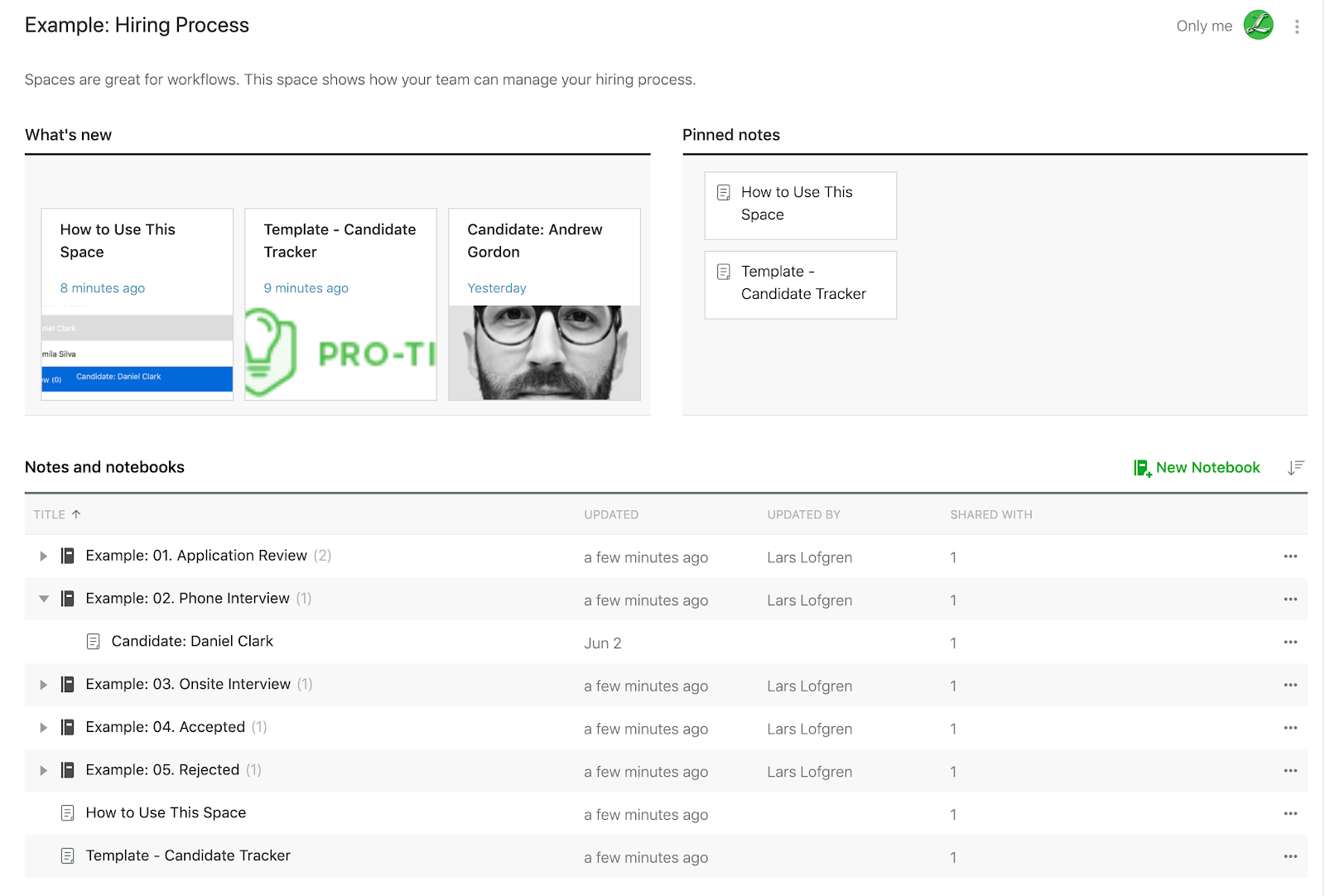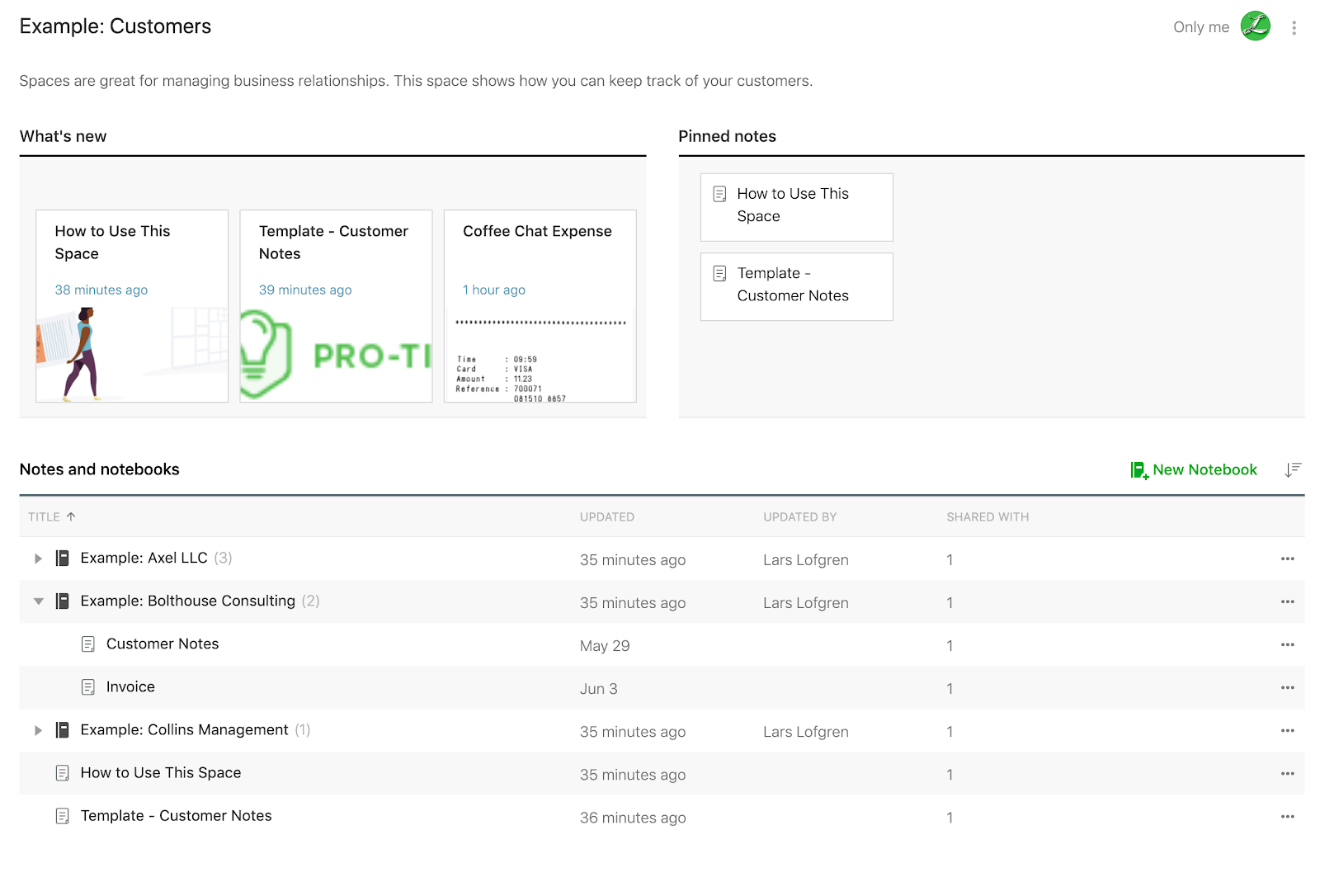Evernote Business Review – Read This Before Purchasing
I’ve personally used Evernote for years. It’s one of my favorite note-taking apps.
Even with the difficulties they ran into along the way, I’m still a fan.
However.
And it pains me to say this.
I cannot recommend Evernote Business under any circumstance.
The short story: Evernote Business is fine as a basic document tool. And it’ll help you manage workflows, store documents, and keep your team updated like any other basic document tool out there. But it has a fraction of the product depth at a price that’s much higher than all the other tools on the market.
Evernote Business charges way too much for far too little.
Let’s start by going through the core elements that your Evernote Business account revolves around.
Evernote Business Core Elements
Just like the version of Evernote for personal use, everything is built around Notebooks and Notes.
The notes feature lets you create a simple document that you can easily edit and fill with whatever content you want.
Notebooks organize your notes into groups.
Pretty simple.
Evernote Business also gives you access to Spaces which are the main product difference between the Business and personal Evernote plans. They have a few more UI elements that allow you to organize any notes and notebooks into a new group.
Here’s an example for hiring:

There’s a feed at the top, a place to pin critical notes, and a place to organize notes and notebooks in whatever order you want. This gives your team one place to see everything on a given topic or project.
The good news is that all of this is very easy to understand. But that’s also the bad news, it’s too simple.
Other than some basic notes and organization, there’s not a whole lot there. Evernote Business really is just the personal version of Evernote with access for multiple people for all your company notes and notebooks. That means your business will outgrow the power of Evernote Business before long.
And Evernote doesn’t offer anything that can’t be easily replaced by any other document tool out there.
Managing Workflows with Evernote Business
How well does Evernote Business help manage our workflows?
It’s fine. But it’s not great either.
Let’s take that use case of hiring. You could build a whole workflow in Evernote with different notebooks marking stages of your hiring process. Then keep a note for each candidate, moving the candidate’s note through the workbooks as they complete different stages. All of this would be easy for your team to view in an Evernote Space.
Then your team could track and manage candidates within Evernote Business.
I see two problems with this. First, it’s using documents and folders to create a basic workflow. This will work in any document tool out there. So there’s no added benefit from using Evernote.
While there’s nothing inherently wrong about using Evernote Business for managing workflows with basic documents, what’s the point? Use whatever document tool that you already have. G Suite and Office 365 are the main options. And if you’re looking for something more hip and fresh, try Notion or Quip which have both pushed usability in the document space forward. If nothing else, there’s always an old-school wiki like Confluence.
Second, by the time you need a dedicated workflow for something like hiring, you should be looking at real tools for hiring like JazzHR or BambooHR. Basic notebooks aren’t going to cut it at that point.
Evernote also offers an example workflow for managing customer relationships:

That’s a CRM.
If you need a CRM, go get a CRM. Some of the largest and fastest-growing software businesses are CRMs because of how important CRM workflows are to any business. As soon as you can no longer manage your customer relationships with a basic spreadsheet, get a CRM. Most companies completely depend on their CRM for their day-to-day operations, it’s not an area to skimp on.
Trying to build a CRM workflow within Evernote Business would be a waste of your time when you could be setting up a real CRM. Even in the super early days of any business, setting up a real CRM has a lot of advantages.
Whatever workflow you’re trying to manage, you can use any document tool in the early days. Then look for a workflow-specific tool when you outgrow basic documents and folders. Either way, Evernote Business doesn’t offer a compelling solution at either stage. G Suite and Office 365 work just as well and you’re probably already paying for one of them. No reason to double up and pay for Evernote Business too.
Using Evernote as a Knowledge Base
Think of a knowledge base as your company handbook. It’s a collection of all the information that you want to share with employees and make sure they have easy access to.
My knowledge bases usually end up as an organized collection of standard operating procedures (SOPs), postmortems, and overview documents.
One other way to think of knowledge bases: they include all the finished documents that you want to organize.
Like other use cases, Evernote Business is fine as a knowledge base but doesn’t do anything that other tools can’t. I can get all the same functionality by creating a bunch of Google Docs and throwing them into a Google Drive folder. When I want to build a real knowledge base for a company, Confluence is my preferred choice.
Evernote Business runs into the same problem as the workflow management use case. I can use any document tool for the same results in the early days and there are much better options as soon as I want a dedicated tool.
Managing Projects with Evernote
What about managing a standard project?
Does Evernote Business help manage all the notes, brainstorms, drafts, deliverables, and to-dos for a standard project?
It’s the same story here too, Evernote Business does just as well as any standard document tool. And not nearly as well as the dedicated project management tools out there.
Trello, Basecamp, Jira, and Asana all run circles around Evernote Business. And Trello has an amazing free plan so budget won’t limit you here.
For those of you that want to keep the number of tools to a minimum, Notion has much better document and project management features compared to Evernote Business at about half the price.
All of these tools give you a much stronger command of projects by helping you:
- Assign tasks to people
- Keep track of all tasks across a project
- Stay on top of deadlines
- Prioritize tasks
- Communicate updates across the team
- Give everyone constant visibility
Evernote helps you with these items as much as a standard Word document would help. Yes, it’s totally possible to manage projects with a basic Word doc (or Evernote). I know world-class project managers that have managed insanely complicated projects with just sticky notes to prove a point. But why make it harder than it needs to be? I’d rather get a tool that was built specifically for project management.
Collecting Research with Evernote Business
Notes and research are probably the use cases that Evernote performs best. When doing a ton of research, having a stripped-down tool to collect all your notes does make things faster.
This is the one use case that Evernote out-performs other document products since Evernote is simpler than any other tool on the market.
But it doesn’t improve the research process enough to justify paying $15/month per user. That’s higher than G Suite’s most expensive plan. I also have a hard time justifying an entire line-item in my budget just for note-taking across the team. People have such divergent preferences on note-taking anyway, it’s a fool’s errand trying to get them all using the same tool.
For me, I do all of my business related note-taking and research in Google Docs these days. They’re still streamlined enough that I never find them getting in my way. I don’t see any major cost by using another document tool for note-taking.
Evernote Business = Too Expensive for Too Little
Ultimately, nothing in Evernote Business is bad. It’s fine. And for research and note-taking, Evernote does pretty well.
But with a price point of $15/month per user, Evernote Business doesn’t come close to other products on the market. Even G Suite’s most expensive plan is $12.50/month per user. And that includes a full product suite (Docs, Sheets, and Slides), Google Drive storage, company access to Gmail, and a full admin toolset to manage everything. Notion also has a deep product suite starting at $8/month per user. Both include much stronger products at lower prices.
And when part of your business outgrows basic documents, you’ll be better served by getting a dedicated tool for that workflow. Like a full-fledged CRM or project management tool. There’s no reason to stick with Evernote for the long-term or try to customize it too deeply.
Evernote Business simply doesn’t come close to offering the same value to businesses that other products do. Even though I personally love using Evernote for note-taking, I’d never move an entire team to it.

